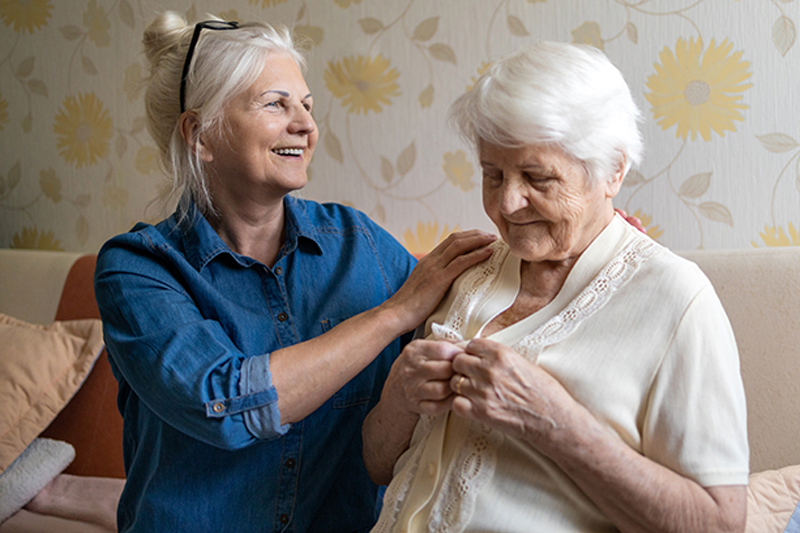
Managing the symptoms of middle stage dementia requires flexibility and creativity.
Receiving the news that a senior family member has been diagnosed with dementia is life-changing. Thinking through the many different facets and factors associated with the disease as well as its effects, both presently and in the future, may be overwhelming.
In this three-part series, we’ll examine the early, middle and later stages of dementia. We’ll explore the type of care needed during each stage, what family caregivers should expect, and how Morning Glory Home Care can help.
Contact us online or call us at 618-667-8400 to learn more about how we can help you and your family with specialized dementia care.
Symptoms of Middle Stage Dementia: What Caregivers Can Expect
Symptoms of middle stage dementia often manifest slowly, and can even be unnoticeable initially. Gradually, a senior in this stage will start to experience advancing difficulty with daily tasks, such as getting dressed. It’s vital for family caregivers to continue to foster a sense of autonomy, allowing the senior to do these tasks at his or her own pace for as long as possible (and as long as it is safe to do so). This involves patience, flexibility, and adaptability.
It will also become essential to commit more time to providing care, and also to develop innovative strategies and approaches to decrease frustration – for your loved one and for yourself. Self-care becomes vitally important in the middle stage of dementia in order to help caregivers manage stress.
Here is what you might expect to encounter during this stage:
Behavior Changes
- Anxiety
- Irritability
- Depression
- Repetitive behaviors
- Aggressive outbursts (physical and/or verbal)
How You Can Help
Keeping a calm demeanor is key. Never argue or try to reason with someone in the middle stage of dementia. In a soothing and calm tone, recognize the feeling behind the behavior and offer suggestions in order to help. As an example: “Grandma, I can see you’re feeling frustrated about misplacing your favorite blouse. It is probably in the washing machine. This yellow one looks fabulous on you; do you want to wear it today?”
Take into account that the words and actions being used are not a reflection of you personally, but simply part of the common development of dementia. In many cases, there is an underlying emotion, such as fear, exhaustion, or hunger, driving the behavior. Make an effort to determine the root cause and tackle that.
Communication Changes
- Losing train of thought
- Forgetting a word or phrase
- Repeating statements or questions
- Using more non-verbal communication
How You Can Help
Accept whatever form of communication is effective for the individual, without attempting to correct him or her. Adjust your communication technique to make it easier for the senior to understand and respond to you. As an example, rather than asking open-ended questions (“What would you like for lunch today?”) offer an option between just two choices (“Would you like chicken or tuna for lunch today?”). Speak in a clear, soothing tone, and allow your senior loved one plenty of time to reply without jumping in and providing the answer yourself.
Safety-Related Changes
- Wandering
- Driving concerns
- Sundowning
In this stage of the disease, paying closer focus on safety issues becomes crucial. Driving should stop – something that’s typically challenging for older adults to accept. If possible, include the senior loved one in making this decision. If not, a note from the doctor prohibiting driving is often the most effective way to gain his or her consent. If the senior is adamant about continuing to drive, you may want to take possession of the keys, or exchange his/her set of keys with nonworking ones.
Likewise, sundowning and wandering become alarming and hard for family caregivers to manage independently. Partnering with an established and trusted care provider with experience in dementia care, like Morning Glory Home Care, is an ideal solution. Our caregivers can take the night shift, making sure that older adults are safe and distracted with interesting activities when struggling to sleep – enabling family caregivers to get the rest they need.
For additional details on our specialized dementia care in Belleville, IL and the surrounding areas, and to learn how we can help a senior you love with in home care needs, reach out to us at 618-667-8400.
